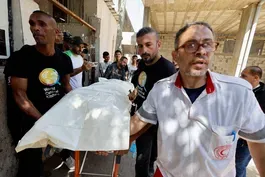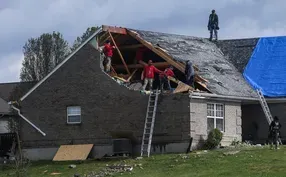
Retired military officials discuss Israeli aid convoy strike
Clip: 4/3/2024 | 8m 39sVideo has Closed Captions
Was Israeli strike on aid convoy negligence or accident? Retired military leaders weigh in
Following Israel's deadly strike on aid workers in Gaza and the international outrage it caused, Nick Schifrin has views from Wes Bryant, a retired U.S. Air Force joint terminal attack controller who called in air strikes and led strike planning cells, and retired Israeli Lt. Col. Jonathan Conricus who commanded IDF forces in Lebanon and the Gaza Strip.
Problems with Closed Captions? Closed Captioning Feedback
Problems with Closed Captions? Closed Captioning Feedback
Major corporate funding for the PBS News Hour is provided by BDO, BNSF, Consumer Cellular, American Cruise Lines, and Raymond James. Funding for the PBS NewsHour Weekend is provided by...

Retired military officials discuss Israeli aid convoy strike
Clip: 4/3/2024 | 8m 39sVideo has Closed Captions
Following Israel's deadly strike on aid workers in Gaza and the international outrage it caused, Nick Schifrin has views from Wes Bryant, a retired U.S. Air Force joint terminal attack controller who called in air strikes and led strike planning cells, and retired Israeli Lt. Col. Jonathan Conricus who commanded IDF forces in Lebanon and the Gaza Strip.
Problems with Closed Captions? Closed Captioning Feedback
How to Watch PBS News Hour
PBS News Hour is available to stream on pbs.org and the free PBS App, available on iPhone, Apple TV, Android TV, Android smartphones, Amazon Fire TV, Amazon Fire Tablet, Roku, Samsung Smart TV, and Vizio.
Providing Support for PBS.org
Learn Moreabout PBS online sponsorshipNICK SCHIFRIN: And, today, a U.S. official confirms that President Biden will speak with Prime Minister Benjamin Netanyahu tomorrow.
For more on this, we get two views.
Retired Master Sergeant Wes Bryant had a 20-year career in the Air Force And deployed to Iraq, Afghanistan and Syria.
As a joint terminal attack controller, he called in airstrikes and led air targeting cells.
He's also the co-author of "Hunting the Caliphate: America's War on ISIS and the Dawn of the Strike Cell."
And retired Israeli Lieutenant Colonel Jonathan Conricus had a 24-year career in the Israeli Defense Forces.
He commanded combat forces in Lebanon and Gaza and was most recently an IDF international spokesperson.
He's now a senior fellow at the Washington-based think tank The Foundation for Defense of Democracies.
Thanks very much.
Welcome, both of you, to the "NewsHour."
Jonathan Conricus, let me start with you.
As we just heard, the chief of the general staff called this incident a -- quote -- "misidentification."
Can you explain how that's possible, when, as the World Central Kitchen says, it was coordinating with the IDF on its movements?
LT. COL. JONATHAN CONRICUS (RET.
), International Spokesperson, Israel Defense Forces: What I understand from the IDF's after-action review, which has not yet been completed, what the IDF has said so far, we are responsible, we are accountable, and this is not Hamas' doing, we did it.
That's number one.
What they have not -- they have been establish -- able to establish that.
What they have not yet been able to establish is, how did this misidentification happen and how was an aid convoy mistaken for a vehicle carrying terrorists, and who made the wrong decision, who misunderstood a very complex and dynamic battlefield, and who got it wrong?
I personally know that they are investigating it now, waiting for the outcomes for a transparent and honest after-action review.
NICK SCHIFRIN: Wes Bryant, what's your response to those two words, one, misidentification that we heard from the chief of the general staff, and as Jonathan Conricus said, some kind of misunderstanding or misunderstood a complex battlefield?
MASTER SGT.
WES BRYANT (RET.
), U.S. Air Force: Yes, and I appreciate those remarks.
Misidentification does, of course, happen in combat, but, to me, this strike is just an effect or a demonstration of a broader problem.
And that's a pattern of targeting negligence, a pattern of indifference towards civilian harm, and a pattern of disregard toward international humanitarian law that the IDF has, unfortunately, though being our allies and though having a clear precedent to go after Hamas, which is a dangerous and brutal terrorist organization, that the IDF has, unfortunately, demonstrated throughout their operation in Gaza.
NICK SCHIFRIN: Jonathan Conricus, can you respond to that, targeting negligence and a disregard for civilian casualties?
LT. COL. JONATHAN CONRICUS: Yes, I think those are very unfortunate and uncorrect comments or an assessment of IDF practices.
I, myself, have been in the targeting rooms or the cells where we do those processes.
I have seen the process, I have seen the legal overview, and I have seen the intelligence vetting that is done, which is part of protocol, before we strike.
We operate in an extremely complex environment, unlike expeditionary missions, which I think is the benchmark that you will bring up and give me examples of.
But that benchmark is not really relevant because we are talking about defending our homeland here.
We do not have the same leisure and time to be super extra careful when it comes to taking out live military targets, because our civilians are at risk here.
Israel is committed to the international law of armed warfare.
Israel takes precaution.
Israel uses distinction and proportionality, but that does not mean, sadly, that Palestinian civilians do not get wounded or killed on the battlefield.
But the responsibility for that is, first and foremost, with those who set up the battlefield.
And that is Hamas, not Israel.
NICK SCHIFRIN: Wes Bryant, take on those two points.
One, there is a difference, as Jonathan Conricus put it, between fighting, as you did in Afghanistan and Iraq and Syria, and fighting in Israel itself or next to it in Gaza, but also the international humanitarian law, specifically distinction and proportionality.
Do you believe the IDF is following those two tenets?
MASTER SGT.
WES BRYANT: Well, on the second point, I absolutely don't, for the most part.
I think an over 30,000 casualty ratio.
Whether or not 9,000 or 10,000 of those are Hamas operatives, that's a huge ratio between civilian casualties and combatants.
With comparing past wars with this, yes, every war has its differences, but urban combat is urban combat and war is war.
More importantly, international humanitarian law is just that.
And what I see the IDF doing is taking the principles of military necessity and proportionality and saying that basically any civilian loss that happens is justified because of the military necessity of this target.
It's just not the way the U.S. conducts warfare.
Even with the civilian harm that the U.S. has caused, which it has caused civilian harm, and we know that, the U.S. itself would absolutely not be conducting a targeting campaign in the way that IDF has in the last few months.
And that's something that I think I think the whole world is paying attention to you, and I think both Israeli and U.S. government need to pay closer attention to you.
NICK SCHIFRIN: Jonathan Conricus, you're shaking your head.
LT. COL. JONATHAN CONRICUS: Yes, I can personally tell of hundreds of strikes that have been aborted in real time in this war in Gaza because of the presence of children, civilians, women, elderly, and people who we assessed were not enemy combatants, and strikes, airstrikes, were called off because the proportionality between the military necessity and the importance of taking out a certain target did not warrant or justify the killing or the probable wounding of civilians.
The Gaza battlefield is an area which is virtually impossible to fight in without having noncombatant casualties.
That is how Hamas has rigged the battlefield.
That is what we are fighting.
And that is the sad reality that we, by trying to move civilians out of the battlefield, have tried to negate.
That's what the Israeli Defense Forces did in the beginning.
We called on civilians to evacuate because we know that fighting high-intensity warfare in urban terrain is a horrible endeavor that leads to casualties.
NICK SCHIFRIN: Wes Bryant, Hamas has rigged the battlefield.
How much does that matter, in your opinion, as you assess the IDF campaign?
MASTER SGT.
WES BRYANT: Well, Hamas' known use of human shields does not negate the other combatant, IDF in this case, the responsibility to protect civilian and noncombatant lives.
So the IDF has put out statements, up to Netanyahu, Netanyahu himself, that these strikes have unwitting or involuntary human shields that Hamas is using, and, therefore, it's justified that we went after this target and we can't avoid, in some of these cases, killing these civilians.
Well, unfortunately, through that, IDF has also acknowledged that they are still striking when civilians or involuntary human shields are actually known in the target area.
And that's obvious even just from the reporting and the other corroboration that we see.
And so that's a problem under U.S. law of war.
That would be a violation of our law of war and international humanitarian law.
And other -- under all common interpretations, it would be as well.
I don't doubt that the IDF is calling off strikes, is aborting in some cases.
They're just not doing it enough.
NICK SCHIFRIN: I know there's a lot more to discuss.
Unfortunately, we're out of time.
I want to thank you both.
Wes Bryant, Jonathan Conricus, thanks very much for both of your time.
LT. COL. JONATHAN CONRICUS: Thank you.
MASTER SGT.
WES BRYANT: Thank you.
Anatomy of a Donald Trump speech
Video has Closed Captions
Clip: 4/3/2024 | 7m 10s | Anatomy of a Donald Trump speech (7m 10s)
Andrés accuses Israel of deliberately targeting WCK members
Video has Closed Captions
Clip: 4/3/2024 | 2m 28s | José Andrés accuses Israel of deliberately targeting World Central Kitchen members (2m 28s)
FEMA administrator on expanding access to disaster relief
Video has Closed Captions
Clip: 4/3/2024 | 6m 26s | FEMA administrator discusses expanding access to disaster relief (6m 26s)
The journey asylum seekers make through Mexico to reach U.S.
Video has Closed Captions
Clip: 4/3/2024 | 10m 37s | A look inside the journey asylum seekers make through Mexico to reach U.S. border (10m 37s)
News Wrap: Storm system brings tornadoes to South, Midwest
Video has Closed Captions
Clip: 4/3/2024 | 4m 39s | News Wrap: Storm system brings tornadoes to South and Midwest, snow to New England (4m 39s)
Primary protest votes hint at challenges for Biden and Trump
Video has Closed Captions
Clip: 4/3/2024 | 4m 16s | Primary protest votes hint at November challenges for Biden and Trump (4m 16s)
Women's college basketball's historic rise in viewership
Video has Closed Captions
Clip: 4/3/2024 | 6m 22s | Can women's college basketball sustain its historic rise in viewership? (6m 22s)
Providing Support for PBS.org
Learn Moreabout PBS online sponsorshipSupport for PBS provided by:
Major corporate funding for the PBS News Hour is provided by BDO, BNSF, Consumer Cellular, American Cruise Lines, and Raymond James. Funding for the PBS NewsHour Weekend is provided by...


















